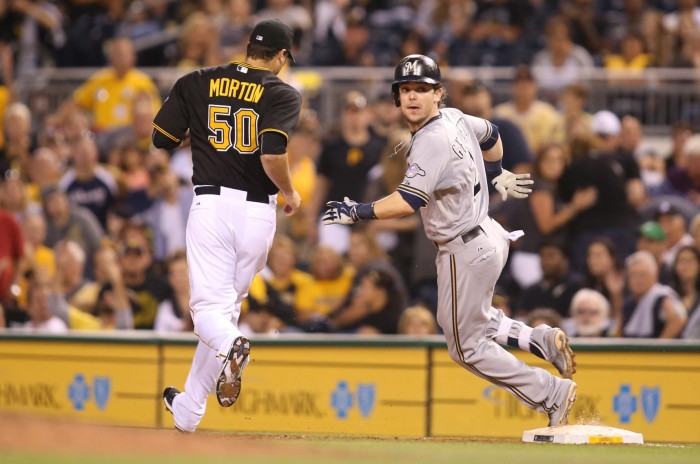The Brewers are a rebuilding team, without a doubt. They spent last season and this offseason unloading veterans in favor of prospects or flyers, and they have therefore ended up with a relatively young roster (per ESPN, the second-youngest in baseball). The lack of proven veterans who will demand playing time is a positive for the young players on the roster; because only a couple positions are spoken for on an everyday basis, the team will have the opportunity to give its young players legitimate playing time. Furthermore, because the organization has so many young players on the cusp of the big leagues who basically require big league at-bats if they are going to develop further, this can only benefit the team.
Somehow, though, the Brewers have ended up with just one veteran in limbo. Only three players on the roster have even accumulated enough service team to have reached free agency, and a fourth is just a couple months away. But Jonathan Lucroy will be the team’s starting catcher on Opening Day (assuming he is not traded before then) and nearly everyday thereafter, Matt Garza will be given every opportunity to stick in the rotation given that he is signed for one more year, and Ryan Braun will play everyday in either left or right field for the foreseeable future.
This leaves Aaron Hill, who was recently acquired in the Jean Segura deal and is generally unlike every other player on the roster. He can be used either as depth or as trade bait, and he has some value in either role. I’m sure that, ideally, the Brewers would prefer to flip him for someone younger and more potentially useful for their future, but if they can’t, he might actually be useful on the field.
The 2016 infield will have very little resemblance to the 2015 one. New signing Chris Carter will play first base, new acquisition Jonathan Villar will likely open the year as the shortstop, and new acquisitions Garin Cecchini and Will Middlebrooks will likely platoon or split time as needed at third base. Both Carter and Villar seem like acceptable stopgaps; neither can possibly be expected to be a star, but both are competent big leaguers who fill a role but would be easy to shove aside should prospect promotion require a rejiggering of the defensive alignments.
Cecchini and Middlebrooks represent an interesting combination of players. Cecchini hits left-handed and Middlebrooks hits right-handed, so in theory they could platoon. Both are former top-100 prospects whose developments have stalled, although Cecchini only has 40 career big-league plate appearances so there may still be some room for growth. Overall, though, the Brewers are likely to give each a shot to earn the everyday job, and they will hope that some combination of the two is good enough to get by.
Second base continues to look like a wasteland, however. Scooter Gennett got the majority of the playing time there in 2015, but he is not very good and doesn’t have much potential left either. Once Orlando Arcia arrives in the big leagues, Jonathan Villar will likely shift over, but that isn’t likely to happen on Opening Day and Villar isn’t a permanent solution anyway.
So here enters Aaron Hill. Given that he was a salary throw-in to a larger deal just a couple weeks ago, we can assume that there wasn’t much of a trade market for him this winter and so David Stearns is unlikely to have much success trying to trade him between now and Opening Day. This leaves two options: play him or designate him for assignment.
A DFA is always possible, and it certainly would not surprise me. However, I expect the Brewers to give Hill the opportunity to play. Gennett’s performance over the past two seasons clearly indicates that taking playing time from him is not really harming the club’s future, and Arcia is unlikely to break camp with the big-league club (if only for Super 2 reasons) so Villar will be counted on to be the everyday shortstop.
This means that, in all likelihood, Hill will have the opportunity to earn playing time, and that would probably be the best-case scenario for Milwaukee. He has the potential to be a relatively valuable bench bat who can play second and third in a crunch. So, while the Brewers have no need for someone with that positional flexibility—assuming Cecchini and Middlebrooks prove competent enough at third—other teams might. And if Hill hits well enough to earn a spot in the big leagues, the Brewers just might be able to get something from him at the trade deadline, which would go a long way towards justifying their $6 million investment.
Again, Hill hasn’t been a productive player since 2013, which was the last time he posted a competent TAv (.288) and was approximately average overall (1.8 WARP). This makes it unlikely he will be any good in 2016, either, especially in a situation that will not guarantee him regular at-bats. The most likely outcome for his Brewers’ career is a quick exit, whether that be in spring training or the first couple months of the season. However, the best-case scenario would be that he hits just enough to make him an attractive candidate for a contender looking for a bench bat, and the Brewers would have to be thrilled if that came to pass.
